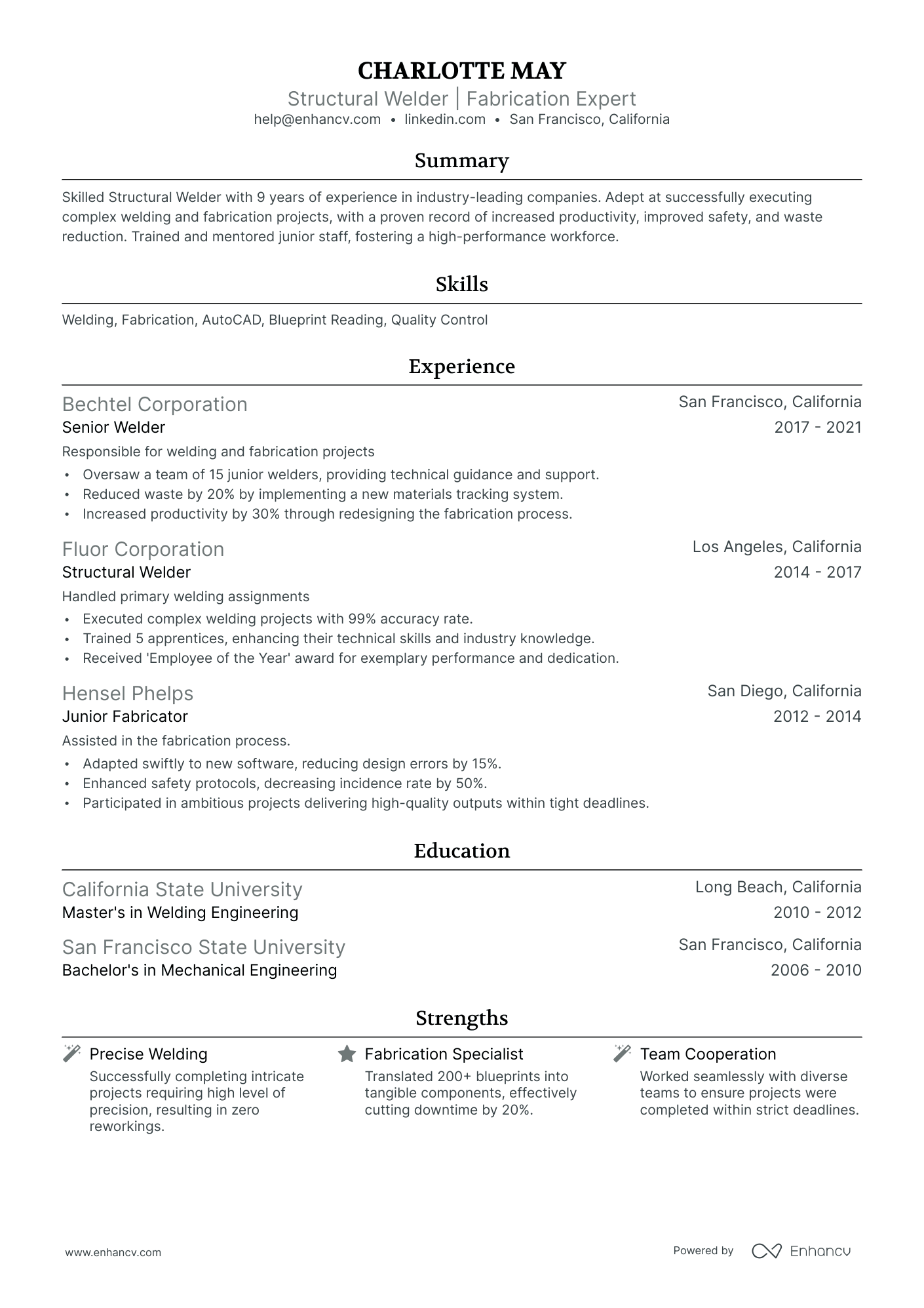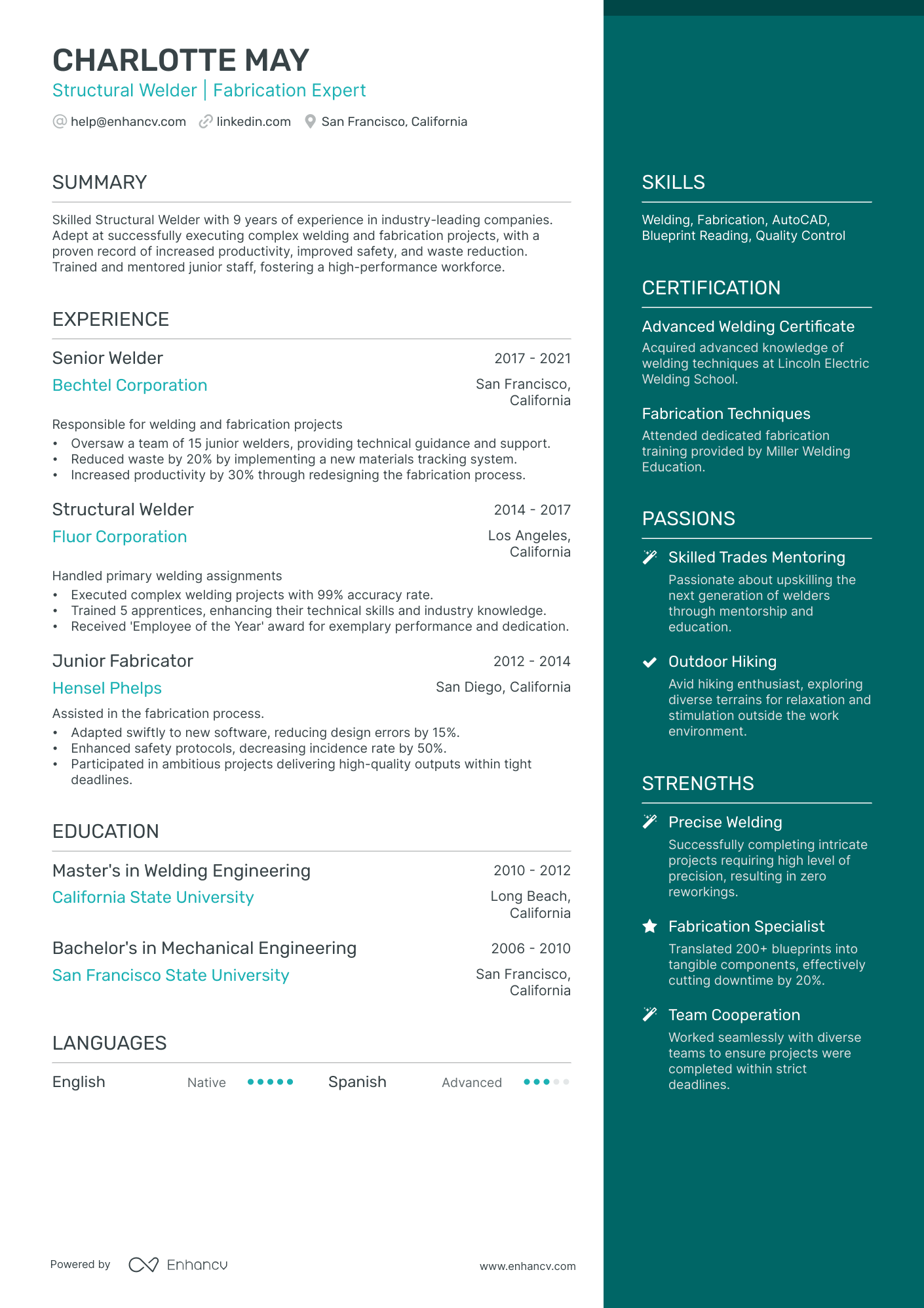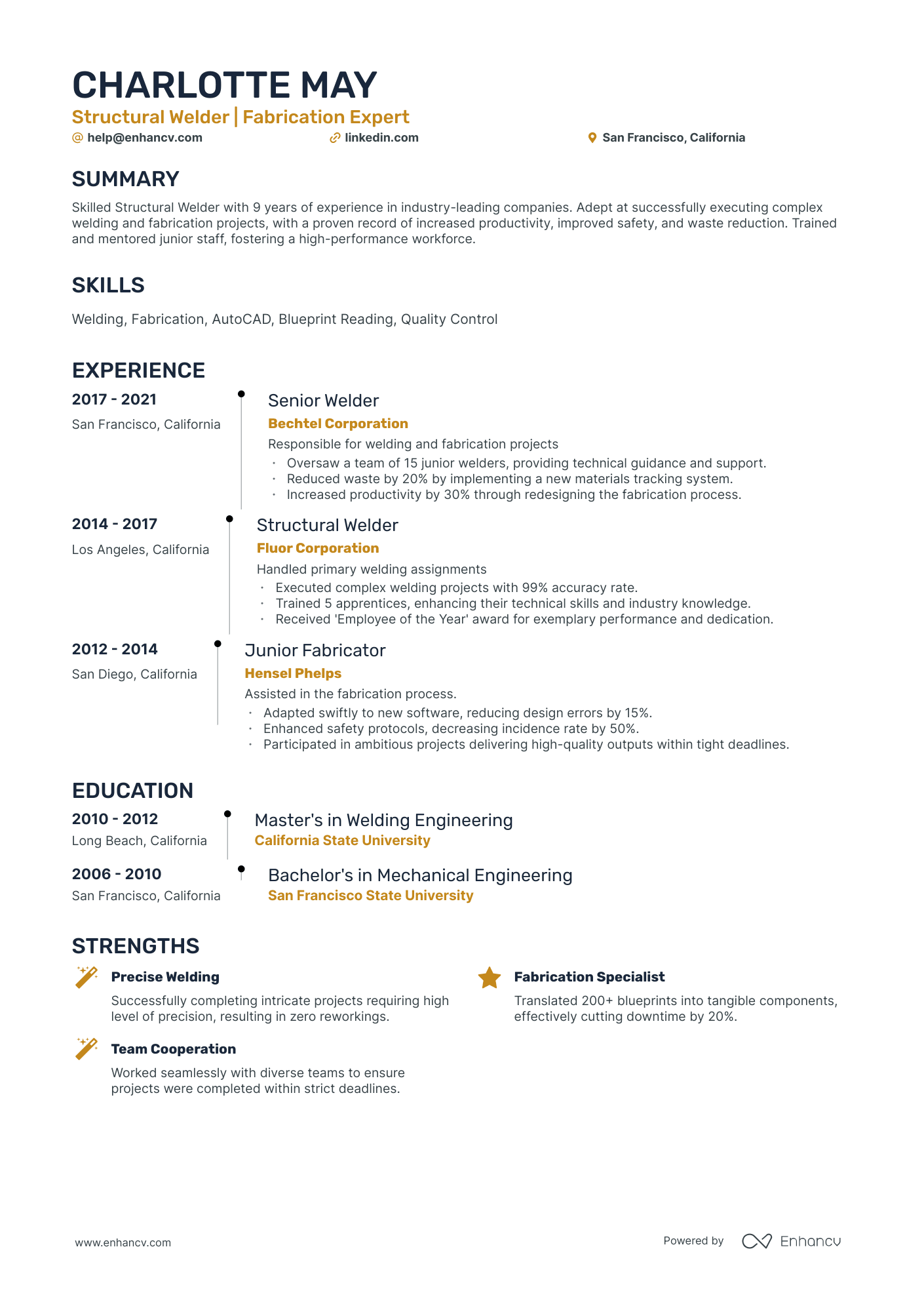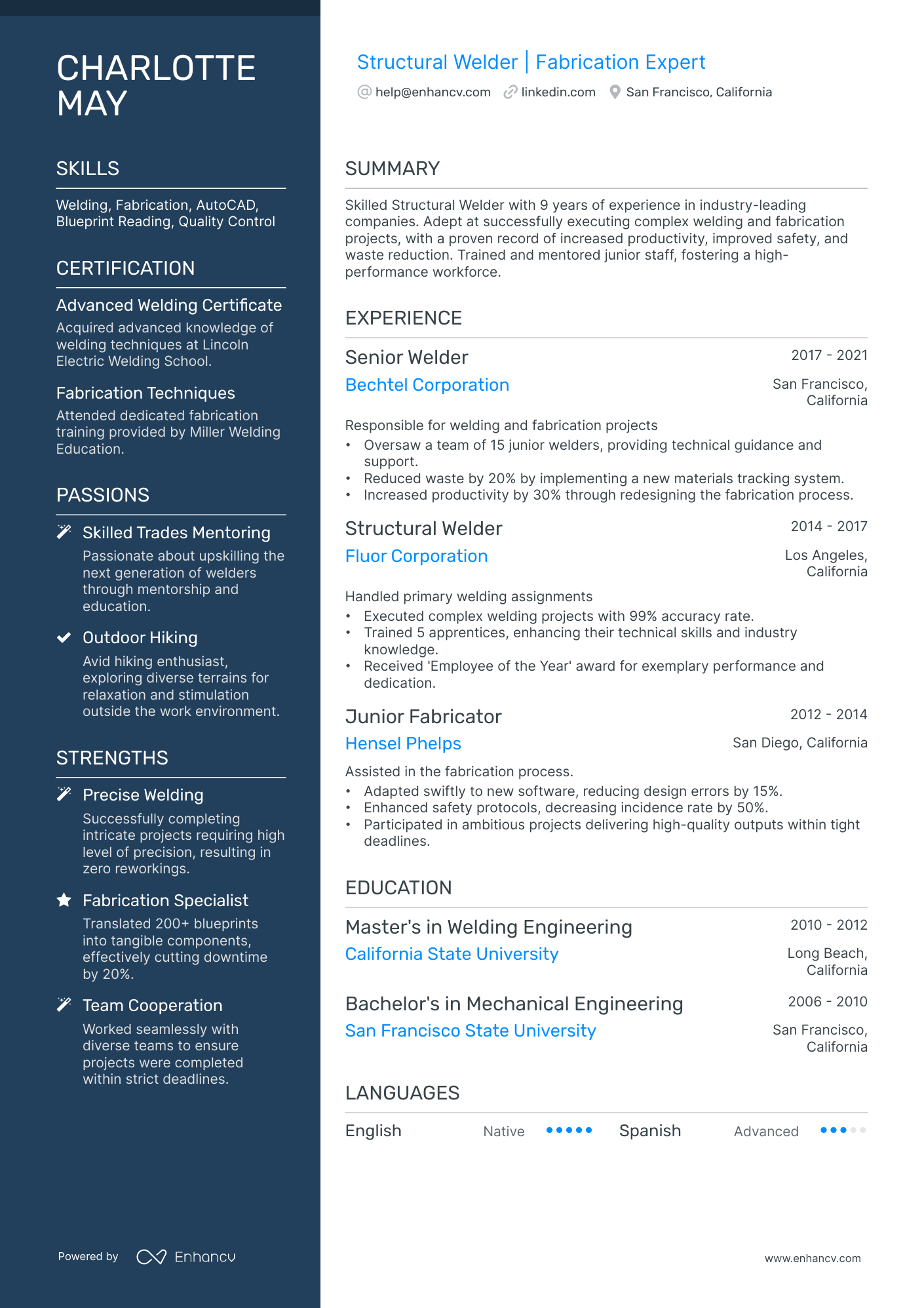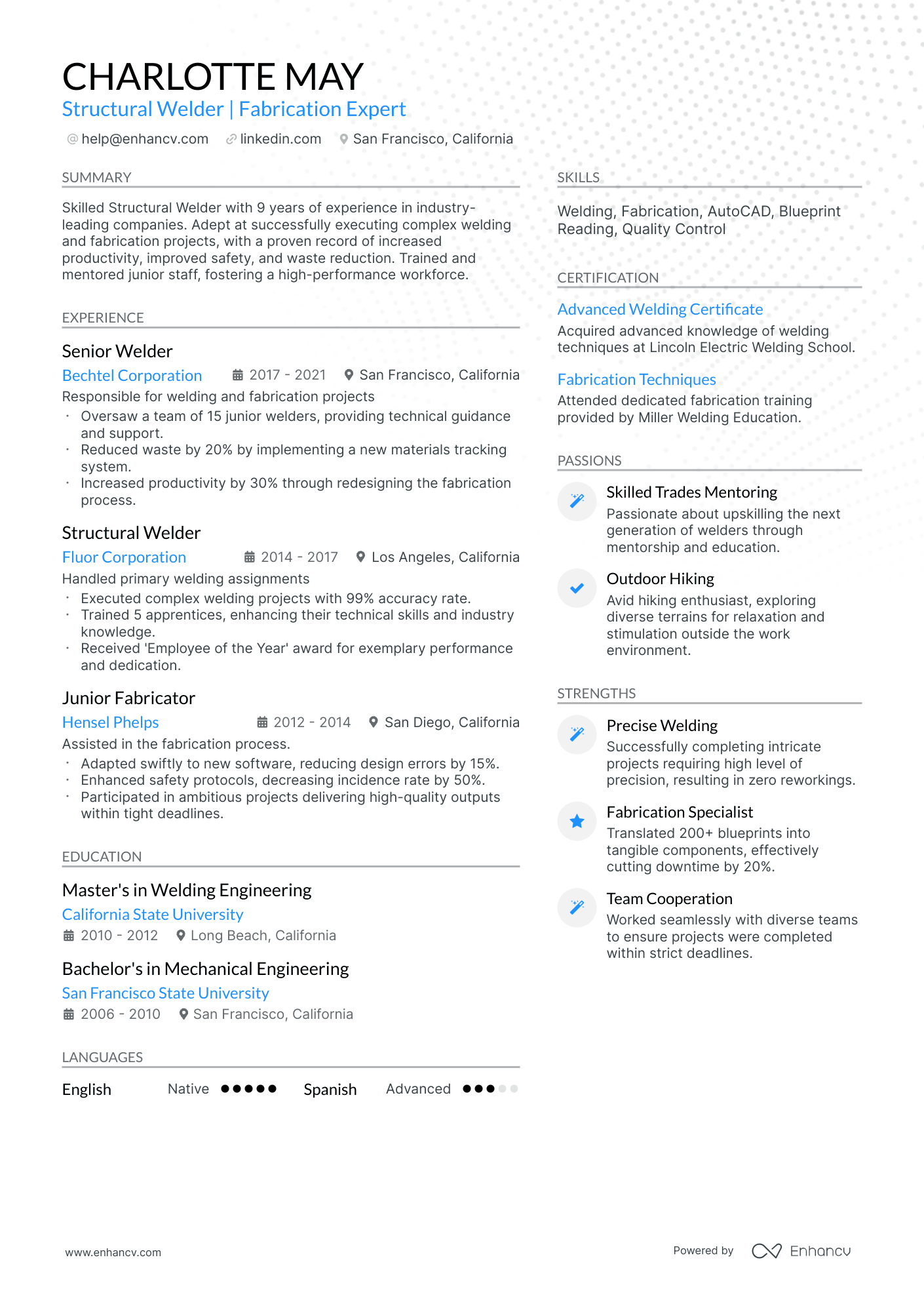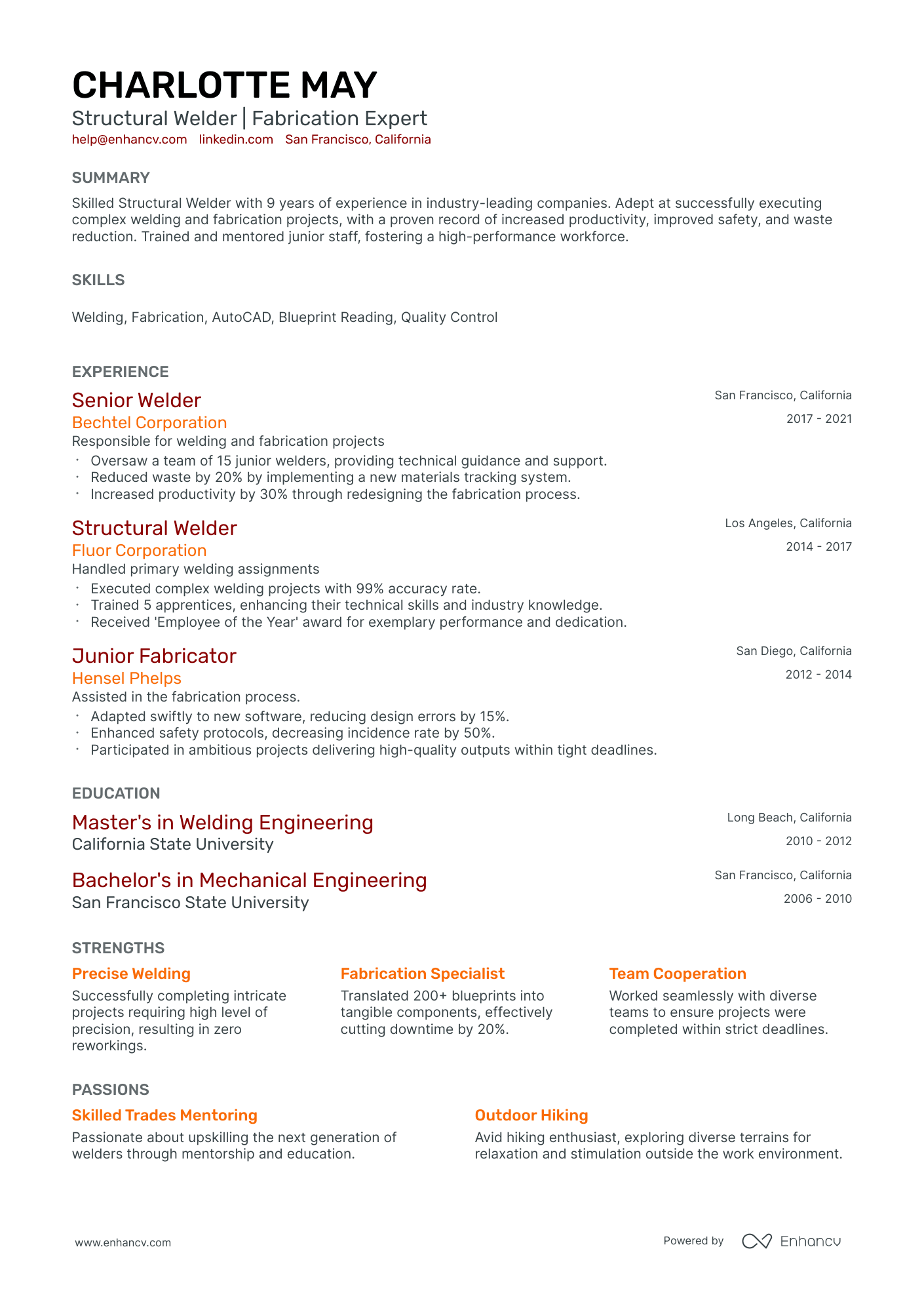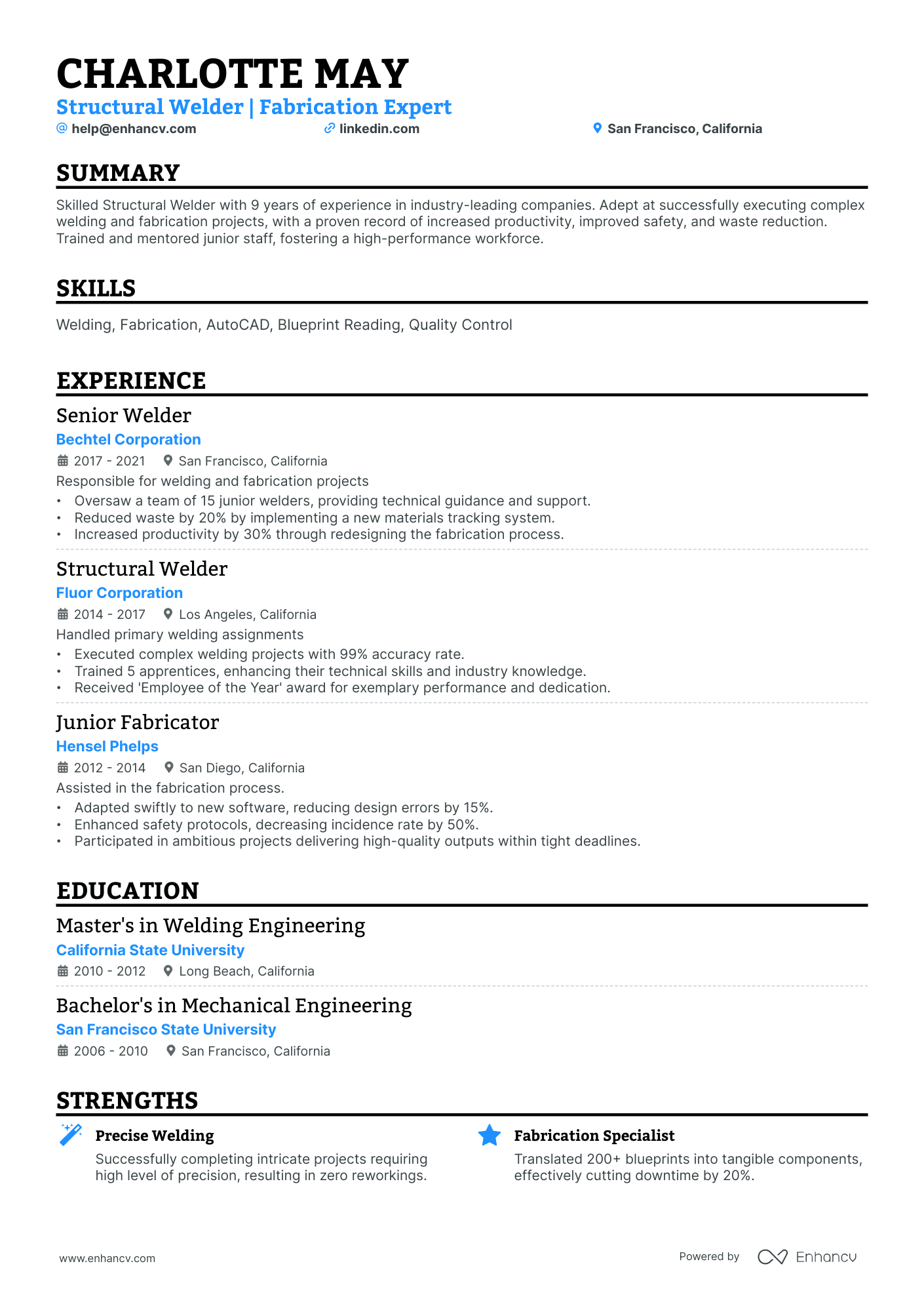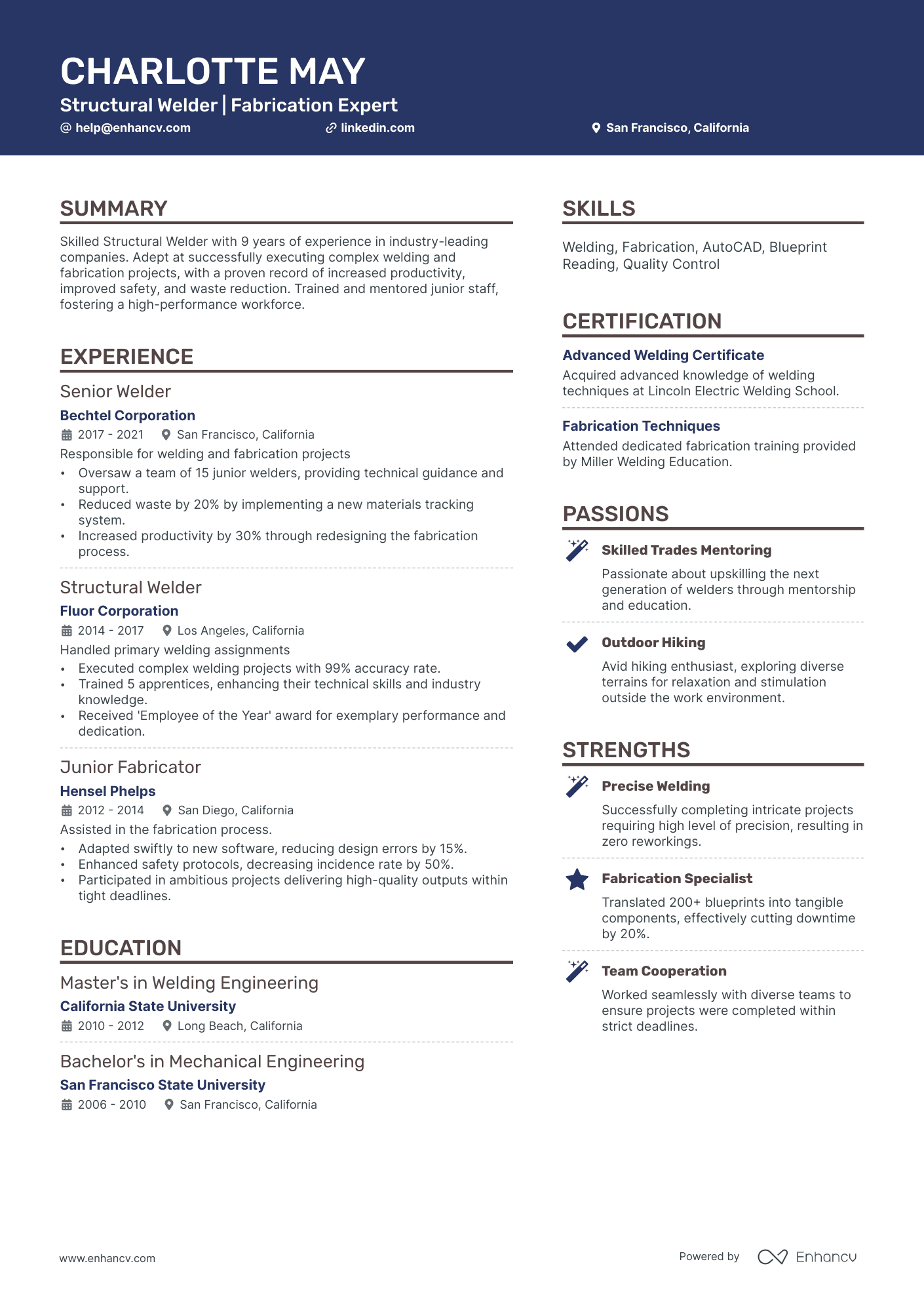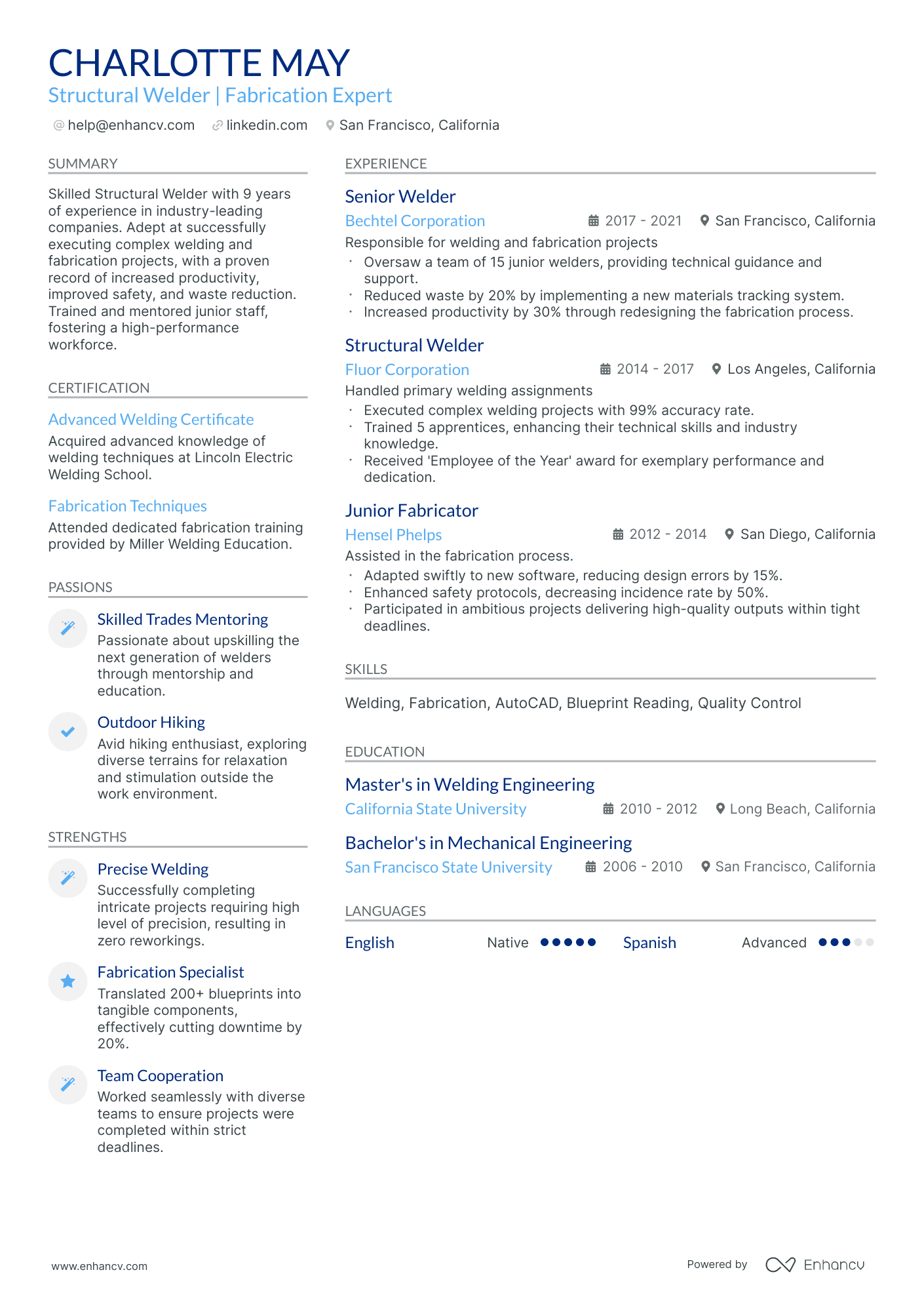Structural welders often struggle to effectively highlight their specialized technical skills and experience in different welding processes on their resume. Our guide can assist by providing precise language and examples to demonstrate your proficiency in various welding techniques, along with advice on how to position your hands-on experience and certifications prominently.
Dive into our comprehensive guide to crafting a standout structural welder resume:
- Discover structural welder resume samples that have secured positions at top-tier companies.
- Master the aesthetics of your resume layout for maximum impact.
- Strategically present your achievements and skills across various resume sections.
- Convey to recruiters why you're the perfect fit for the job.
Recommended reads:
Simple guide to your structural welder resume format
Successful structural welder resumes all have something in common - candidates invest in a simple resume layout . One that is easy to read, makes a good first impression, and is adapted to their professional experience.
There are three distinct resume formats , which help you focus on different aspects of your resume. Those are:
- A reverse-chronological resume format - puts your most recent experience in the spotlight
- A functional skill-based resume format that makes your transferrable skills the center of attention
- A hybrid resume format - it combines skills and experiences.
What's more, keep in mind that your resume usually goes through an ATS (Applicant Tracker System) (i.e. the software used by companies in the hiring process).
The structural welder resumes that suit the ATS:
- incorporate exact match keywords and skills from the job description;
- should be no longer than two pages;
- should be submitted in a PDF format, unless specified otherwise.
Upload your resume
Drop your resume here or choose a file. PDF & DOCX only. Max 2MB file size.
Pro tip
Prioritize clarity and organization in your structural welder resume. Use ample white space, choose readable fonts, and clearly delineate each section.
Don't forget to include these six sections on your structural welder resume:
- A header for your contact details and a summary that highlight your alignment with the structural welder job you're applying for
- An experience section that explains how you apply your technical and personal skills to deliver successful results
- A skills section that further highlights how your profile matches the job requirements
- An education section that provides your academic background
- An achievements' section that mentions any career highlights that may be impressive, or that you might have missed so far in other resume sections
What recruiters want to see on your resume:
- Certifications: Certifications from recognized institutions, such as the American Welding Society, are essential in demonstrating competence and adherence to safety standards.
- Hands-on Experience: Prior experience in structural welding, ideally in a similar industry. This shows familiarity with best practices and processes related to the profession.
- Technical Skills: Proficiency in various welding techniques like MIG, TIG, and arc welding, understanding of blueprints and schematics, metal fabrication, etc.
- Physical Stamina and Strength: Welding is physically demanding work, and resumes should reflect the ability to handle these demands effectively.
- Safety Record: A history of maintaining safe work environments, following safety protocols, and reducing accidents or injuries in previous roles.
Recommended reads:
The experience section of your structural welder resume: your professional journey
The experience section is your platform to narrate your professional story. Recruiters scrutinize this section to gauge your unique value proposition.
Here are five steps to craft a compelling experience section:
- Highlight relevant roles, including the company, role description, and tenure, supported by up to six bullet points per role.
- Emphasize tangible outcomes of your contributions, using quantifiable metrics where possible.
- Integrate positive feedback or endorsements to bolster your claims.
- Ensure verb tense consistency when detailing responsibilities.
- Summarize significant achievements relevant to each role.
Explore how seasoned structural welder professionals have crafted their experience sections to secure roles at industry-leading firms.
- Performed structural welding on large-scale projects, including bridges and industrial facilities.
- Executed welds according to blueprints and specifications, ensuring precision and adherence to quality standards.
- Collaborated with a team of welders to complete projects within strict deadlines.
- Utilized various welding techniques such as MIG and TIG welding to join metal components effectively.
- Inspected welds for defects and performed necessary repairs to ensure structural integrity.
- Operated welding equipment to fabricate and assemble metal structures for commercial buildings.
- Worked on-site, conducting field repairs and modifications to existing structures.
- Collaborated with engineering teams to develop innovative welding techniques, resulting in improved efficiency.
- Completed welding projects within budget and ahead of schedule, exceeding client expectations.
- Followed strict safety protocols and maintained a clean work area to prevent accidents and ensure compliance.
- Specialized in underwater welding, performing repairs and maintenance on offshore oil rigs.
- Used diving equipment and specialized tools to carry out welding tasks in challenging underwater environments.
- Collaborated with dive teams and engineers to identify and address structural issues, ensuring operational efficiency.
- Implemented improved welding procedures, resulting in a 20% reduction in repair time and cost.
- Conducted thorough inspections to detect defects and performed necessary repairs, ensuring structural integrity.
- Fabricated and welded structural components for high-rise buildings and architectural projects.
- Operated computerized welding machines, ensuring precise and accurate welds.
- Collaborated with design teams to translate blueprints into tangible metal structures.
- Demonstrated expertise in stainless steel welding, resulting in seamless finishes for luxury residential projects.
- Performed non-destructive testing on welds to ensure quality and compliance with industry standards.
- Joined a specialized welding crew responsible for the construction of large-scale industrial plants.
- Welded heavy-gauge metals using shielded metal arc welding (SMAW) techniques.
- Contributed to the completion of a major petrochemical plant, resulting in increased production capacity.
- Assisted in training junior welders, ensuring adherence to safety protocols and quality standards.
- Operated cutting equipment to prepare materials for welding, optimizing project workflow.
- Perform structural welding on various construction projects, including commercial buildings and infrastructure.
- Implement advanced welding techniques, such as robotic welding, to enhance productivity and precision.
- Collaborate with project managers to develop cost-effective welding strategies, resulting in reduced expenses.
- Conduct thorough inspections and tests on welded joints, ensuring compliance with industry standards.
- Train and mentor new welders, promoting skill development and maintaining high-quality workmanship.
- Worked in a shipyard environment, welding structural components for marine vessels.
- Performed weld repairs on ships, ensuring compliance with maritime safety regulations.
- Collaborated with naval architects to develop customized welding solutions for specific vessel requirements.
- Executed welding tasks under challenging conditions, including tight spaces and adverse weather.
- Conducted x-ray inspections on welds, ensuring quality and integrity of the finished structures.
- Specialized in seismic-resistant welding for infrastructure projects in high-risk earthquake zones.
- Executed welds on critical structures, such as bridges and power plants, using specialized techniques.
- Participated in post-earthquake repair projects, mitigating damage and restoring structural stability.
- Collaborated with engineering teams to develop welding procedures that met seismic design specifications.
- Implemented non-destructive testing methods to ensure the reliability and longevity of seismic welds.
- Worked on offshore oil platforms, performing structural welding and maintenance tasks.
- Operated heavy machinery and cranes to position large components for welding.
- Contributed to the successful completion of a major platform upgrade project, resulting in increased production.
- Inspected welds for defects using ultrasonic testing equipment, ensuring compliance with industry standards.
- Followed strict safety protocols and participated in safety drills to maintain a hazard-free work environment.
- Lead a team of structural welders, overseeing welding operations for large-scale construction projects.
- Implemented advanced welding automation systems to optimize efficiency and reduce labor costs.
- Collaborated with engineers and architects throughout the project lifecycle, ensuring precise execution of designs.
- Developed and implemented welding procedures that improved productivity and reduced rework by 15%.
- Conducted regular quality audits and inspections to maintain high standards of workmanship.
The following content includes information from "O*NET OnLine" by the U.S. Department of Labor, Employment and Training Administration (USDOL/ETA). Used under the CC BY 4.0 license. The data represents the top responsibilities present on the task lists for structural welder professionals.
Top Responsibilities for Structural Welder:
- Operate safety equipment and use safe work habits.
- Examine workpieces for defects and measure workpieces with straightedges or templates to ensure conformance with specifications.
- Weld components in flat, vertical, or overhead positions.
- Detect faulty operation of equipment or defective materials and notify supervisors.
- Recognize, set up, and operate hand and power tools common to the welding trade, such as shielded metal arc and gas metal arc welding equipment.
- Select and install torches, torch tips, filler rods, and flux, according to welding chart specifications or types and thicknesses of metals.
- Mark or tag material with proper job number, piece marks, and other identifying marks as required.
- Determine required equipment and welding methods, applying knowledge of metallurgy, geometry, and welding techniques.
- Prepare all material surfaces to be welded, ensuring that there is no loose or thick scale, slag, rust, moisture, grease, or other foreign matter.
- Align and clamp workpieces together, using rules, squares, or hand tools, or position items in fixtures, jigs, or vises.
Quantifying impact on your resume
<ul>
Strategies for candidates with limited resume experience
Lack of extensive experience doesn't mean you can't make a strong impression. Here's how:
- Thoroughly understand the role's requirements and reflect them in key resume sections.
- Highlight transferable skills and personal attributes that make you a valuable candidate.
- Use the resume objective to articulate your growth vision within the company.
- Emphasize technical alignment through relevant certifications, education, and skills.
Remember, your resume's primary goal is to showcase how you align with the ideal candidate profile. The closer you match the job requirements, the higher your chances of securing an interview.
Recommended reads:
Pro tip
If your experience section doesn't directly address the job's requirements, think laterally. Highlight industry-relevant awards or positive feedback to underscore your potential.
Decoding the essence of your structural welder resume: hard and soft skills
Every job description communicates the desired hard and soft skills. These skills are the backbone of your application.
Hard skills are your tangible, technical proficiencies, often validated through certifications or hands-on experience. On the other hand, soft skills reflect your interpersonal abilities and how you navigate diverse work environments.
To effectively spotlight these skills on your resume:
- Create a distinct section for technical skills, listing the most relevant ones for the job.
- Highlight your strengths by weaving in achievements that underscore specific skills.
- Strike a balance between hard and soft skills to present a well-rounded profile.
- If multilingual, include a language proficiency section, emphasizing the interpersonal advantages it brings.
Stay tuned for a deep dive into the most in-demand hard and soft skills in the industry.
Top skills for your structural welder resume:
MIG welding
TIG welding
Stick welding
Blueprint reading
Welding equipment operation
Metal fabrication
Welding safety procedures
Gas cutting
Welding inspection techniques
Welding metallurgy
Attention to detail
Problem-solving
Teamwork
Communication
Time management
Adaptability
Critical thinking
Physical stamina
Work ethic
Interpersonal skills
Next, you will find information on the top technologies for structural welder professonals from "O*NET OnLine" by the U.S. Department of Labor, Employment and Training Administration (USDOL/ETA). Used under the CC BY 4.0 license.
Top technologies for Structural Welder’s resume:
- IBM Notes
- Microsoft Outlook
- Scientific Software Group Filter Drain FD
- Value Analysis
- Oracle Database
- Recordkeeping software
Pro tip
Double-check the spelling of all skills and tools on your resume. Remember, software like the Applicant Tracker System (ATS) scans for these details.
Highlighting your educational and certification milestones on your structural welder resume
While skills alignment is increasingly prioritized, your educational background and certifications still play a pivotal role in establishing credibility.
To effectively present your academic and certification achievements:
- Detail your educational journey, including the institution and duration.
- Highlight recent and relevant certifications, showcasing your commitment to continuous learning.
- Be concise; focus on the skills and knowledge gained rather than exhaustive details.
- If a certification is in progress, mention the expected completion date.
Remember, authenticity is key. If a certification is pending, be transparent about it.
Best certifications to list on your resume
Pro tip
If you have basic certificates, place them in the skills or experience section. This saves space for high-demand industry certificates.
Recommended reads:
Adding a summary or objective to your structural welder resume
One of the most crucial elements of your professional presentation is your resume's top one-third.
This most often includes:
- Either a resume summary - your career highlights at a glance. Select the summary if you have plenty of relevant experience (and achievements), you'd like recruiters to remember about your application.
- Or, a resume objective - to showcase your determination for growth. The perfect choice for candidates with less experience, who are looking to grow their career in the field.
If you want to go above and beyond with your structural welder resume summary or resume objective, make sure to answer precisely why recruiters need to hire you.
What is the additional value you'd provide to the company or organization?
Now here are examples from real-life structural welder professionals, whose resumes have helped them land their dream jobs:
Resume summary and objective examples for a structural welder resume
How to include other relevant sections for your structural welder resume
Apart from the standard sections listed in this guide, you have the opportunity to get creative when building your profile.
Select additional resume sections that you deem align with the role, the department, or the company culture.
Here are the ones we recommend:
- Language skills - use a profficiency framework to indicate your aptitude level;
- Hobbies and interests - you can share more about your favorite books or how you spend your time. It's great for culture alignment;
- Volunteering - helps you highlight the causes you care about and hints at people skills you gained such as teamwork, emotional intelligence, and organizational skills;
- Awards - the space for your most prominent structural welder professional accolades and achievements.
Make sure that these sections don't take too much away from your experience, but instead build up your structural welder professional profile. You can add them as a second column to your resume, or on a second page.
Key takeaways
- Pay special attention to the tiny details that make up your structural welder resume formatting: the more tailored your application to the role is, the better your chances at success would be;
- Select the sections you include (summary or objective, etc.) and formatting (reverse-chronological, hybrid, etc.) based on your experience level;
- Select experience items and, consequently, achievements that showcase you in the best light and are relevant to the job;
- Your profile will be assessed both based on your technical capabilities and personality skills - curate those through your resume;
- Certifications and education showcase your dedication to the particular industry.
